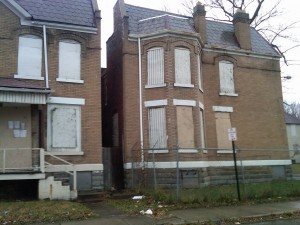 Many, many books, articles, and experiences have inspired and influenced this Urban Homesteading idea (see Part 1). I cannot possibly include them all here – but I have tried to include a few items that capture the major themes that have inspired me.
Many, many books, articles, and experiences have inspired and influenced this Urban Homesteading idea (see Part 1). I cannot possibly include them all here – but I have tried to include a few items that capture the major themes that have inspired me.
This first article deals with urban agriculture and its economic impact. It focuses on Will Allen’s remarkable project in Milwaukee, WI. He has an outstanding template for feeding urban America. Next is an article about urban farming in the Twin Cities. Reading these – I’m just struck with how magnetic the vision of a village with a teeming public market and local farmers and artisans is. It is the sort of place people gravitate towards to live or visit.
Then, there’s this refreshingly honest article about Hardwick, VT. This small town looked to its agricultural roots to develop its future – and they’ve added at least 75 jobs to this community of just over 3000 over a few years’ time. The fourth article is an inspiring story about a Boston neighborhood where the residents managed the redevelopment of their own neighborhood. Taken individually, these stories are interesting enough – but when you start to connect their themes, I see some really provocative patterns start to emerge:
*Sustainable agriculture is the only moral course for our future
*Communities can plan their own future
*The people that live in a place know how to make it better
*Small, locally-owned businesses – and lots of them – are at the core of any healthy and stable economy.
However, the most remarkable pattern that I see here is that ownership in a society changes everything. Home ownership in the Boston neighborhood. Business ownership in all of the pieces. But moreover, each of the communities discussed took ownership of their future. They did not hand the project off to an outside developer to create it for them.
While I see tremendous potential in giving property to people to homestead and letting them drive the redevelopment process, it is the potential I see in Bo Burlingham’s book: Small Giants – Companies That Choose to be Great Instead of Big, that just makes me tingle. Everyone should read this book. It looks inside fourteen businesses – from a wide variety of industries – that each made a conscious decision to remain small, privately owned, rooted in a community, and to give back to that community. Could you imagine if a region had the opportunity to cultivate five or ten of these ‘Small Giants’ in one place? What kind of impact would that have on the region’s economy? What would the job market be like with between five and ten – twenty? – very successful employers – who have no plans of moving the business elsewhere? What impact would it have on the quality of life for the people that lived there?
The Proposal
As I said, I do not wish to convince you so much as inspire you. So please, do the reading; check out the book and these links. Then dream, and dream big, think about the possibilities outside the big box stores. Then if you find this idea interests you at all, and you would like to explore things further – I have an offer to make. Mr. Potts and I have found our way to a smaller Michigan city with excellent infrastructure, but missing most of it’s population. House prices are very low, property taxes are quite modest, there is substantial funding to start-up a small business within the city, and there is a remarkable cooperative ethic in the area: more than 15 different credit unions! (One of them Catholic!) So, when you decide you’d like to explore the possibilities; we stand ready to welcome you to the the area and get to work on making a 21st century “Homesteading Act” a reality… Consider it a “City of Virtue Project” for Distributists… kind of like the Libertarians in New Hampshire.
We suspect that a handful of resident families (five? six?) will have to further shape and advocate for this plan to the City. And failing formal public support, most of the structures for this kind of urban pioneering are already in place – this group of families could simply provide a ‘landing pad’ of mutual support for Distributists that would like to come and join the effort. We could collectively initiate the sort of learning center that Mr. Aleman so eloquently outlines in the most recent issue of Gilbert Magazine, teaching: Catholic Social Teaching, Characters of Distributism, Aims and Means of the Catholic Worker, Benedictine Spirituality, Small Business Development; Practical courses in homesteading, craftsmanship, and the like. We could be as he describes- “Part learning center, intentional community, and perhaps think-tank”; and initiate genuine reform that can be replicated.
Simply put, the offer is this:
If you want to seize this moment- and this really is the moment we’ve been waiting for- our family stands ready to support yours in making the move. Working together we can build a City of Virtue in what remains of a city Capitalism has assaulted, and left for dead.
Thank you so much for your careful consideration. Pax, Caritas, et Bonum.



